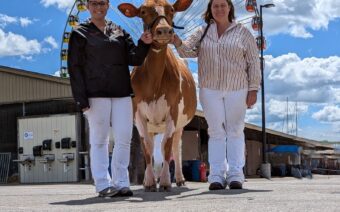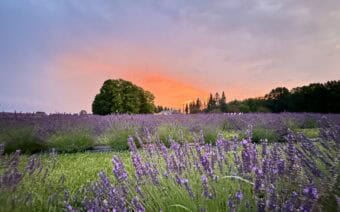
April 3, 2024
ALGOMA ñAccording to the American Farm Bureau Federation (AFBF), the mission of its Partners in Advocacy Leadership (PAL) program is to create advocates for agriculture and accelerate personal development for engaged members of the organization.
Each year, AFBF welcomes agriculture professionals from across the country into the program — with Rachel Harmann of Lakeshore Land & Livestock in Algoma participating in this most recent go-around.
Harmann — who also graduated from the Wisconsin Farm Bureau’s Leadership Institute Class XIV a couple of years ago — said she can’t get enough education.
Attending the University of Wisconsin-River Falls, Harmann obtained a bachelor’s degree in agricultural education.
Fitting the bill of an advocate for agriculture, she currently serves as Door County Farm Bureau’s vice president and local affairs chair, is a former Alice in Dairyland finalist, a Master of Beef Advocacy graduate and a Wisconsin Beef Ambassador.
Though all of these experiences have given Harmann new knowledge to apply in the family farm business and her advocacy work on behalf of all farmers, she said it was her participation in PAL that inspired her to pursue her goal of being a public speaker and in earning the appointment as the legislative chair for the Wisconsin Cattlemen’s Association.
“For me, this was the next step in leadership and advocacy training,” she said. “I wanted to further my advocacy skills, my topic knowledge and learn from peers and experts in agriculture.”
The program
The PAL Class 11 was sponsored by the AFBF, the Farm Credit and Bayer CropScience and provided two years of executive-level advocacy training — which includes four learning modules designed to develop specific advocacy skills, including storytelling, policy development and stakeholder engagement.
According to the program’s brochure, available on the AFBF website (fb.org), the modules build on one another over the two years of the program and include intense, in-person, hands-on training.
“Our class’s key focus was climate change & sustainability, so everything we did related to that,” Harmann said. “We did mock testimonies, mock interviews, things like that. All of our messaging focused on those two things, while other PAL classes — before and after me — focused on something different.”
Harmann said when issues come up related to something in American agriculture, the AFBF can point to a class whose focus relates to that particular issue.
“Because each class has been trained on specific topics, we’ve become the subject (matter) experts on those topics and can advocate on behalf of agriculture in those areas,” she said. “If an issue comes up on climate change and sustainability, they’re going to call one of us in (my class). If an issue comes up on something else, they’ll contact a class whose subject matter was on that issue.”
Throughout the two-year program, Harmann said the class traveled to four different locations — three stateside and one abroad.
The first one, she said, was in New York City where they did media training.
“We learned how to do interviews, how to write press releases and how to speak with the general public,” she said. “While we were in New York, we also went to Whole Foods and had to perform certain tasks. I raise beef (cattle), so I had to go find a customer at the meat counter, introduce myself and tell that person what I do and answer any questions they may have had. It allowed them to speak firsthand (to) a farmer.”

The American Farm Bureau Federation’s 11th Partners in Advocacy Leadership program consisted of 10 agricultural-focused professionals from throughout the country, including Rachel Harmann, front, second from right. Submitted Photo
The second module, Harmann said, was in Washington D.C. where the class focused on policy development, legislative business and government relations — things she said she is passionate about.
The third module, she said, took the class to St. Louis, where they talked about stakeholder engagement.
“We talked about how we can partner with folks, how we can share our messages and how we can come to common terms with people who may have differing backgrounds or agendas,” she said.
The fourth and final module, Harmann said, was an international trip to Chile, where the class focused on global perspectives in agriculture.
“Another neat key component of the program is the bond we PALs developed with one another because we went through all those situations together,” she said. “So, if we need to talk or need someone’s opinion on something, we each have nine other individuals across the country we can call upon.”
In between the trips, Harmann said, there was lots of homework, as well as many learning opportunities.
PAL participants were required to make a portfolio about all of their experiences — Harmann’s portfolio is available at RachelHarmann.com.
She said the website also contains lots of information about her family’s farm.
Benefiting from class experiences
Harmann said she feels she’s grown tremendously as a result of the PAL program — both personally and professionally.
“Having those opportunities to push me outside of my comfort zone has been beneficial,” she said. “You can’t grow without putting that pressure on yourself and getting outside of what you know. I’m grateful for those opportunities and now have nine of the best friends across the country that anybody could ask for out of the program, as well as some of the greatest mentors you could have.”
Harmann said her future goals include becoming a public speaker and doing workshops and keynote speaking events — as well as continuing to do legislative work.
“Policy development and legislative topics are things I get excited about,” she said. “I want to continue sharing our farm story with the general public. I’m proud of our farm and what we’re doing, so we need to share that story and be a resource for the general public.”
Harmann said many legislative issues relate to or affect today’s farmers — including health insurance for farmers, a topic she recently spoke about in Madison on behalf of the Wisconsin Farm Bureau.
“This is important to many farmers across the State of Wisconsin,” she said. “When you’re working for yourself on a farm, health insurance isn’t always accessible, and it’s not always affordable. So, I testified on the importance of that.”
Farming a family affair
Harmann, 36, and her husband Eric, also 36, operate Lakeshore Land & Livestock with Eric’s brother, Craig and his wife, Lyndsay.
Between the two couples, five children also help around the farm and will, Harmann said hopefully, take over someday.
The farm, she said, is a sixth-generation farm started by Eric’s and Craig’s great-great-great grandfather, Daniel, some 155 years ago.
At the 2019 Wisconsin State Fair, Harmann said her family’s farm was recognized as a sesquicentennial farm.
Eric and Craig, she said, took over farm operations last year when their father, Gary, unexpectedly died.
“Eric and I have been raising beef on the farm since 2007, while Eric’s dad cash cropped,” she said, adding that at one time, the farm had also been a dairy farm, but in 1994, Gary had sold the dairy cows and focused solely on being a cash crop farmer.
Taking over everything so quickly when he died, Harmann said, was a big challenge, but knew they had a support system they could lean on.
“We knew we had friends we could call upon,” she said. “I had just returned from my first PAL module when Eric’s dad passed. So, I had nine people from the PAL program who I had met, but who were willing to hop on an airplane if we needed them to come do whatever we needed.”
Harmann said they also had folks who were able to help with fieldwork when they needed it.
“We rallied together as a family, and we have a strong faith,” she said. “We took it day by day and everything worked out the way it was meant to.”
A full day’s work
In addition to running the day-to-day operations of the farm, the Harmanns all have other full-time jobs off the farm.
Eric and Craig work full-time at another nearby farm; Rachel works full-time for the American Red Cross and Lyndsay is a sixth-grade teacher at their local elementary school.
“We all work off the farm and we all run this farm (with no other staff to help),” she said. “But we (make it work).”
Farming, Harmann said, is something you have to be excited and passionate about.
“We each put in our 40-plus hours a week someplace else and then come home and get to do what we love,” she said. “This is the new world of agriculture, which is another reason we have to be more sustainable and more efficient in what we do. Farms can’t always always take care of multiple families anymore. So, more and more farmers are working off the farm in addition to still providing food, fiber and fuel for the world.”

The Harmann family farm — Lakeshore Land & Livestock, which grows cash crops and beef cattle — is located on 124 acres in Algoma, right on Lake Michigan. Submitted Photo
Harmann said the farm is 124 acres in total, including some woods and lakeshore property because it is located right on Lake Michigan.
“Only 80 acres are tillable, making it a unique opportunity because we can utilize the land that we can’t grow any crops on to graze our cattle on,” she said. “Using our land for grazing is another way our farm is being sustainable.”
Harmann said she always said that at Lakeshore Land & Livestock, “we raise crops, kids and cows.”
“The main crops we grow are hay, corn and soybeans,” she said. “We raise the cows for meat and sell directly to the consumer. It’s a true family farm in that even the older kids go out and feed the cows, do herd checks, health checks and all sorts of things. They’re definitely hands-on.”
As a family farm — which Harmann said 98% of the farms in America are — “I want people to know we work hard to grow nutritious food.”
“(I want them to know) farmers work diligently to care for the land, the water and the environment because we’re raising our kids on it, too,” she said. “But it’s important for our community and our neighbors, as well.”
Harmann said as the website (lakeshorebeef.com) says: “Our vision is to care for the land and animals that God has entrusted us with while working together as a family for generations to come.”
 Getting students excited about manufacturing
Getting students excited about manufacturing Grainworks Old + New: A destination for bourbon enthusiasts
Grainworks Old + New: A destination for bourbon enthusiasts





